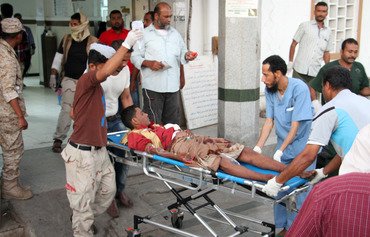The Yemeni government has vowed to uproot hotbeds of terrorism in the wake of a terrorist attack targeting military recruits gathered near al-Sawlaban base in Aden this week.
A suicide bomber from the "Islamic State of Iraq and the Levant" (ISIL) killed 52 Yemeni soldiers and wounded dozens of others on Sunday (December 18th), the latest attack by the group against the army in the city, AFP reported.
The attack targeted a crowd of servicemen who had gathered to collect their salaries near al-Sawlaban base in north-eastern Aden.
It comes eight days after another ISIL bombing at al-Sawlaban killed 48 soldiers and wounded 29 others, and is the fourth attack of its kind this year against the same camp.
ISIL and its jihadist rival al-Qaeda have taken advantage of a conflict between the government and Yemen's Houthi (Ansarallah) fighters to bolster their presence across much of the south.
Moral bankruptcy
Following the incident, Prime Minister Ahmed Obeid bin Daghr pledged the government's commitment to continue its fight against terrorism.
"The terrorist attack, which claimed the lives of dozens of victims, will not deter the government from continuing its war on terrorism and subversive elements who aim to undermine security and stability" at a time when Aden and liberated provinces are enjoying noticeably improved security, he said, according to the official news agency SABA.
At a meeting attended by Deputy Chief of Staff Maj. Gen. Ahmed Saif al-Yafei, Aden Police Chief Maj. Gen. Shalal Shaei and Deputy Prime Minister and Interior Minister Maj. Gen. Hussein Arab, bin Daghr stressed the need for "heightened security and higher level of vigilance for confronting al-Qaeda cells and all who attempt to undermine the security and stability of the country".
"The criminal attacks carried out by the terrorist elements are but clear evidence of their moral bankruptcy and the fact that they are devoid of the values and teachings of our Islamic religion ," Bin Daghr said.
President Abd Rabbu Mansour Hadi placed the responsibility for "any failure or breakdown in security" squarely on the shoulders of the officials in charge of the various security and military agencies.
"As the field officials within their agencies and sectors, they are responsible for the establishment and maintenance of security in general," Hadi said, directing them to implement the required security procedures and tactics "immediately and resolutely", SABA reported.
During a meeting with security and army officials in the wake of the attack, Hadi also directed them to "do everything necessary to issue salaries to security personnel who were martyred or wounded in the terrorist attack, and provide care and comfort to their families".
Security plan in place
Deputy Prime Minister and Interior Minister Maj. Gen. Hussein Arab affirmed the government's determination to "eliminate all hotbeds of extremism and terrorism".
"The security authorities will hunt down the killers and criminals and the arm of the law will catch up with them sooner or later," he said.
During an inspection visit to al-Sawlaban base and al-Joumhouriya hospital to check on the condition of the wounded, Arab said his ministry "has released and distributed a security plan to all [security] committees in all regions", adding that such attacks take place when plans are not implemented as received.
Nasser Jubran, secretary general of Aden's Khormaksar district, said hospitals are still filled with the victims of the December 10th attack on al-Sawlaban.
Jubran called on the government and security agencies to "put an end to the series of crimes being committed by terrorists, especially since there have been four attacks on al-Sawlaban camp this year".
The first attack occurred on May 23rd, the second on July 6th, and the third and fourth on December 10th and 18th, he told Al-Mashareq.
Eliminating hotbeds of terrorism
Political affairs researcher Tariq al-Zuraiqi said the government needs to deal with terrorist groups firmly and take the necessary precautions to protect army and security personnel and the community from suicide attacks.
"Fighting terrorism must be done by eliminating all the hotbeds of terrorism and sleeper cells in a collaborative effort between the security, military and intelligence agencies to prevent the recurrence of such attacks that ISIL and al-Qaeda have become accustomed to carrying out in cold blood," he told Al-Mashareq.
After the hotbeds are dismantled, terrorism must be fought in every aspect, and that cannot be successfully achieved without the establishment of peace and the unification of security and military apparatuses in Yemen, he said.
Yemen Scholars Association member Sheikh Yahya al-Najjar said the latest al-Sawlaban attack is "a most serious crime with a devastating humanitarian impact".
"The perpetrators have no connection to Islam whatsoever, despite the claims made by al-Qaeda and ISIL that they belong to Islam," he told Al-Mashareq. "Islam is innocent of them because it came to promote the values of peace, which are humanitarian values that call for building and life, not death and destruction."
He said religious scholars condemn such criminal attacks, and society as a whole rejects the actions of extremist groups, regardless of the names they use.

![Yemenis gather at al-Sawlaban base in Aden's al-Arish district on December 18th after a suicide bomber targeted a crowd of soldiers. [Saleh al-Obeidi/AFP]](/cnmi_am/images/2016/12/23/6869-yemen-attack-soldiers-600_384.jpg)




